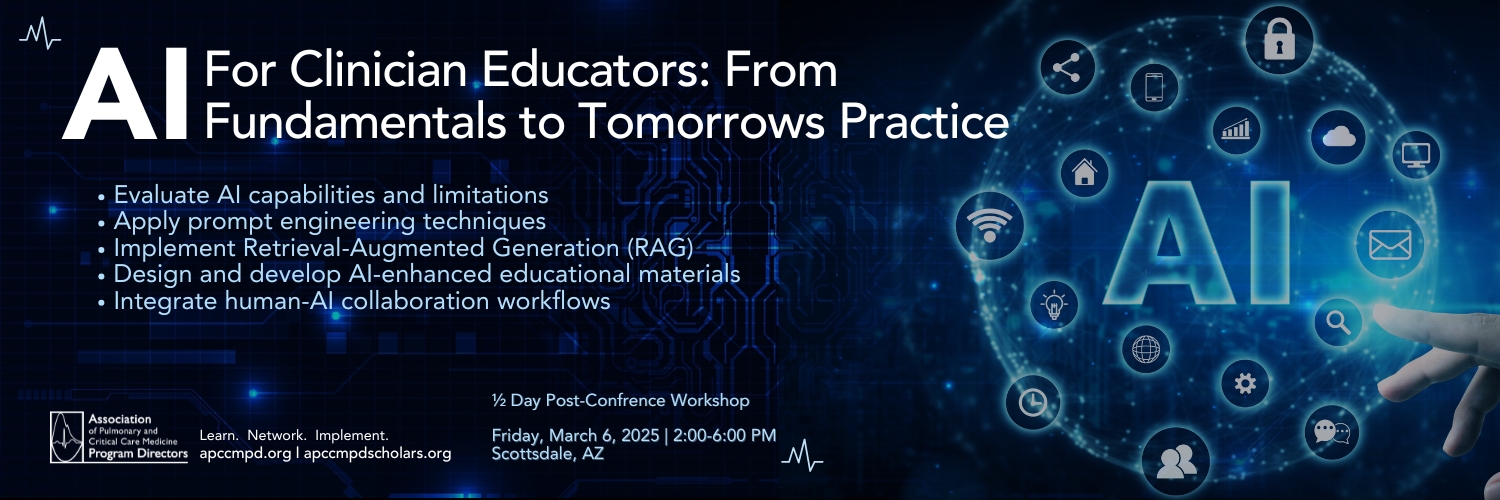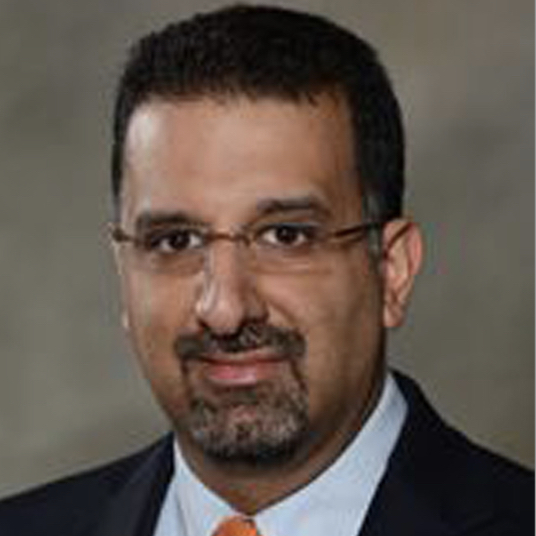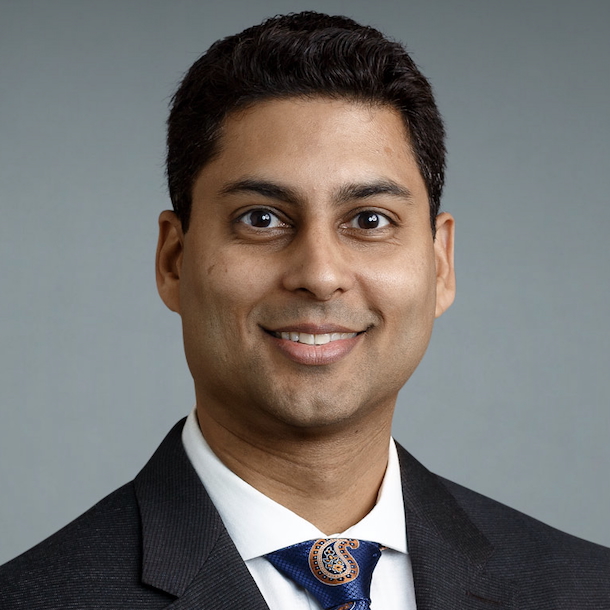|


LEARNING OBJECTIVES | AGENDA | DISCLOSURE | CME CREDIT
- We're excited to offer an AI Certificate Program in Medical Education, but space is limited!
- Offered on a first-come, first-served basis.
- Includes Lunch on Friday, March 6, 2026.
- We hope to see you there!
This comprehensive course equips clinician educators with essential knowledge and practical skills to effectively integrate artificial intelligence into medical education. Participants will progress from foundational AI concepts—including capabilities, limitations, and ethical considerations—to advanced techniques like Retrieval-Augmented Generation (RAG) and precision education through AI-powered simulations. Through hands-on applications and real-world case studies, educators will learn to leverage large language models responsibly, create high-quality educational content, and design personalized learning experiences that enhance teaching effectiveness while maintaining academic rigor and patient safety standards.
LEARNING OBJECTIVES
At the conclusion of this course, participants will be able to:
- Evaluate AI capabilities and limitations in medical education contexts, including identifying common pitfalls such as hallucinations and applying ethical frameworks to address bias, transparency, and privacy concerns.
- Apply prompt engineering techniques to optimize AI-generated educational content and minimize inaccuracies in outputs from large language models.
- Implement Retrieval-Augmented Generation (RAG) strategies to enhance AI accuracy by integrating authoritative medical knowledge sources with AI tools for content development.
- Design and develop AI-enhanced educational materials, including assessment items and patient simulations, that are tailored to specific learner needs and educational objectives.
- Integrate human-AI collaboration workflows into their teaching practice to create valid, reliable, and pedagogically sound educational experiences that leverage AI's strengths while maintaining educator oversight.
TARGETED LEARNERS
This program is targeted towards fellowship and graduate medical education leaders who are serving or aspire to serve in medical education leadership, including participation in the administration of a fellowship program.
- Fellowship Program and Associate Program Directors
- Medical Education Faculty
- Aspiring Education Leaders
Back to top
Agenda
All Times are in MOUNTAIN Time Zone
| AI FOR CLINICIAN EDUCATORS POST-COURSE WORKSHOP SESSIONS // FRIDAY, MARCH 6, 2026 |
| SESSION TIME / TITLE |
SESSION DESCRIPTION / OBJECTIVES |
1:00 PM - 2:00 PM (MST)
|
AI Post-course Attendee Lunch |
2:00 PM - 2:05 PM (MST)
Welcome and Opening Remarks
 
Kristin M. Burkart, MD, MSc
Nitin Seam, MD |
|
2:05 PM - 2:50 AM (MST)
WORKSHOP
What AI Can (and Can't) Do: Fundamentals, Hallucinations, Ethics, and Basics of Prompt Engineering
 
Kristin M. Burkart, MD, MSc
Briana Short, MD
|
This session provides a foundation for understanding artificial intelligence in healthcare education. Participants will learn what AI does well (pattern recognition, language generation, data synthesis), its limitations (hallucinations, lack of reasoning, dependence on data quality), and the ethical considerations surrounding bias, transparency, and patient privacy. The section will also introduce prompt engineering as a practical skill for educators to communicate effectively with large language models (LLMs).
Session objective:
At the conclusion of this session, participants should be better able to:
1. Describe at least three strengths and three limitations of AI in medical education and apply basic prompt-engineering techniques to reduce hallucinations in generated outputs. |
2:50 PM - 3:50 AM (MST)
WORKSHOP
Using your Own Source Materials: Pairing LLMs with Human Knowledge

Nitin Seam, MD
|
This section dives deeper into advanced methods for improving AI accuracy. Participants will explore using their own source materials and learn how combining AI with trusted sources enhances reliability. A practical case study will focus on using notebook LM and Gemini to generate various educational content to share with learners.
Session objective:
At the conclusion of this session, participants should be better able to:
1. Explain how using their own source material improves AI accuracy and demonstrate the process of co-developing educational content using both human knowledge and AI assistance. |
3:50 PM - 4:05 AM (MST)
|
Networking Break |
4:05 PM - 5:45 PM (MST)
WORKSHOP
Generative AI in Everyday Teaching: Simulation for Precision Educators
 
Neal F. Chaisson, MD
Deepak R. Pradhan, MD, MHPE |
This session demonstrates practical, everyday applications of AI for clinician educators. The focus will be on how generative AI can create tailored educational materials and realistic patient simulations that adapt to learner needs. Participants will explore examples of precision education.
Session objective:
At the conclusion of this session, participants should be better able to:
1. Design a teaching activity that uses AI to generate a patient simulation tailored to specific learner objectives in their educational setting. |
5:45 PM - 5:50 PM (MST)
Closing Remarks
 
Kristin M. Burkart, MD, MSc
Nitin Seam, MD |
|
Back to top
Disclosure Declaration
As a jointly accredited provider, the University of Nebraska Medical Center (UNMC) must ensure balance, objectivity, independence, and scientific rigor in its educational activities. Faculty are encouraged to provide a balanced view of therapeutic options by utilizing either generic names or the trade names of several to ensure impartiality.
All speakers, planning committee members and others in a position to control continuing education content participating in a UNMC-accredited activity are required to disclose relationships with commercial interests. A commercial interest is any entity producing, marketing, re-selling, or distributing health care goods or services consumed by, or used on, patients. Disclosure of these commitments and/or relationships is included in these activity materials so that participants may formulate their own judgments in interpreting its content and evaluating its recommendations.
This activity may include presentations in which faculty may discuss off-label and/or investigational use of pharmaceuticals or instruments not yet FDA-approved. Participants should note that the use of products outside currently FDA-approved labeling should be considered experimental and are advised to consult current prescribing information for FDA-approved indications.
All materials are included with the permission of the authors. The opinions expressed are those of the authors and are not to be construed as those of UNMC.
Back to top
Continuing Education and MOC Credit

In support of improving patient care, this activity has been planned and implemented by University of Nebraska Medical Center and Association of Pulmonary and Critical Care Medicine Program Directors. University of Nebraska Medical Center is jointly accredited by the Accreditation Council for Continuing Medical Education (ACCME), the Accreditation Council for Pharmacy Education (ACPE), and the American Nurses Credentialing Center (ANCC), to provide continuing education for the healthcare team.
The University of Nebraska Medical Center designates this live activity for a maximum of TBD AMA PRA Category 1 Credits™. Physicians should claim only the credit commensurate with the extent of their participation in the activity.
Maintenance of Certification (MOC)
Successful completion of this CME activity, which includes participation in the evaluation component, enables the participant to earn up to TBD Medical Knowledge MOC points in the American Board of Internal Medicine Maintenance of Certification (MOC) program.
It is the CME activity provider’s responsibility to submit participant completion information to ACCME for the purpose of granting ABIM or ABP, etc. MOC credit.
Back to top

|







